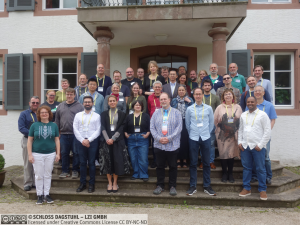
Last week, Dr Angelo Salatino attended an invited prestigious Dagstuhl Seminar addressing the status quo, opportunities, and challenges of Open Scholarly Information Systems.
Over the last 30 years, a wide range of open scholarly information systems have been developed to serve the scientific community. The seminar has been attended by representatives of metadata aggregators like DBLP, OpenAIRE and Wikidata. Metadata and full-text indexing services were represented by CORE (developed by KMi) and data repositories by arXiv.org. There were also representatives of open scholarly knowledge graphs like ORKG and AIDA KG.
This Dagstuhl Seminar was the first event of its kind, bringing together around 40 people who create and maintain these systems with researchers who either study them or use them in their own work. It provided a unique space for dialogue, sharing knowledge, and building new professional relationships to encourage future collaboration.
The program featured a mix of talks and focused discussions on key community challenges, including pathways to the sustainability of open scholarly infrastructures and the role of scholarly knowledge graphs in the open research landscape. Discussions also centered on the future of research evaluation, with calls to move beyond the current ranking systems and address the crucial issue of researcher disambiguation to accurately attribute work. Other challenges involve ensuring all research information, including metadata, is open by default and establishing a clear set of building blocks for a shared, open infrastructure. Lastly, the community is grappling with the role of open scholarly information systems in the age of Scientific Agentic AI and reimagining the future of science communication itself.
Ultimately, two topics stood out as the most pressing and most discussed challenges facing the scholarly information community: the sustainability of open scholarly infrastructures and the role of Open Scholarly Information Systems in the age of Scientific Agentic AI.
The sustainability discussion focused on the idea that past arguments for supporting open scholarly infrastructures may no longer be effective in today’s geopolitical landscape. Governments are increasingly motivated by opportunities for productivity gains, including those driven by AI, as well as concerns over the loss of digital sovereignty caused by reliance on critical infrastructures controlled by foreign or private industries. Such dependency can leave democratic systems vulnerable to information threats. Regardless of one’s stance on these issues, there is broad agreement that universities need open scholarly infrastructures to safeguard digital sovereignty, manage the knowledge assets created by publicly funded research, and offer a sustainable alternative to the prohibitively expensive scholarly databases provided by commercial giants.
Instead, the discussion on the role of Open Scholarly Information Systems (OSIS) in the age of Scientific Agentic AI focussed on several key concerns. A central fear is that the increasing use of agentic AI in scientific knowledge discovery, development, writing, reading, and reviewing could lead to a decline in essential human skills like critical thinking, potentially compromising the quality and integrity of scientific work. This has implications for the education of future researchers, suggesting a shift in the role of a PhD towards developing higher-level analytical abilities rather than just technical proficiency. Above all, the fundamental question was about accountability: when AI systems are involved in research, who ultimately bears the responsibility—the human or the AI? There was a strong emphasis on the future being a collaborative effort between humans and AI, with humans retaining agency and responsibility while AI supports and enhances various stages of the research lifecycle. Moreover, it was discussed the importance of training the next generation of scientists to critique AI and to understand its limitations. Overall, the conversation was a deep exploration of both the opportunities and the inherent challenges at the intersection of OSIS and agentic AI, with a unified focus on maintaining human oversight, ensuring scientific quality, and adapting educational paradigms to navigate the evolving scientific landscape.
Regarding the talk sessions, Angelo introduced the AIDA Dashboard and discussed its underlying Knowledge Graph, architecture, and current challenges. He identified two significant challenges for the research community. First, there is a notable lack of comprehensive conference data outside of computer science, which makes it difficult to aggregate research information across different fields. Second, many academic disciplines lack their own Knowledge Organization Systems. The challenge is to build a complete and detailed system for all disciplines, an effort complicated by issues like differing terminology and a lack of expert consensus.
By fostering collaboration and strengthening our shared commitment to open science, this community of dedicated innovators will help shape sustainable infrastructures and a more connected future for scholarly communication. KMi’s contribution to this event reinforces the highly influential role we play in advancing open scholarly infrastructures worldwide.
Related url:
Open Scholarly Information Systems: Status Quo, Challenges, Opportunities

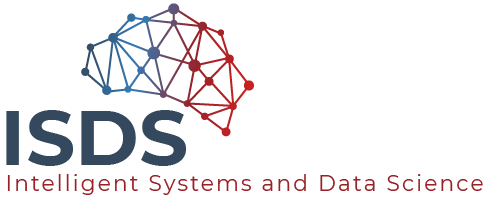

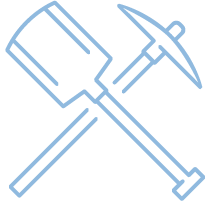 Scholarly Knowledge Mining
Scholarly Knowledge Mining
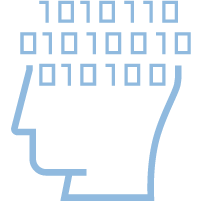 Digital Humanities
Digital Humanities
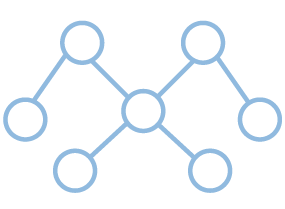 Data Science
Data Science
 Smart Cities and Robotics
Smart Cities and Robotics